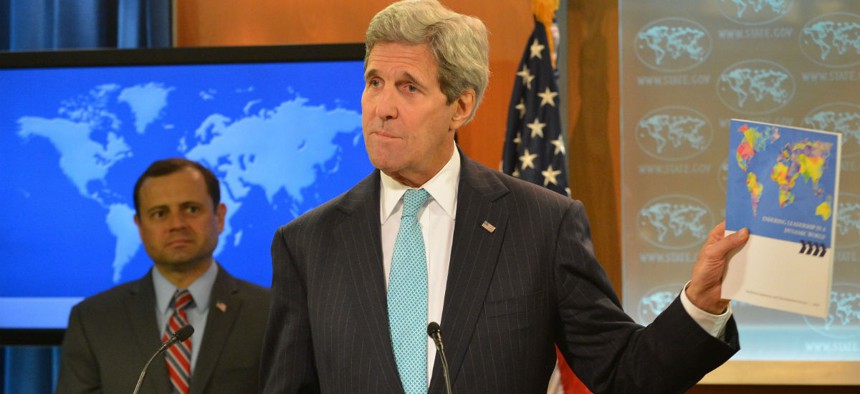
Secretary of State John Kerry releases the 2015 Quadrennial Diplomacy and Development Review on Tuesday, along with Special Representative for the QDDR Tom Perriello. State Department
How One Agency Will Use Sabbaticals and Rotations to Retain Employees
State Department plans major workforce initiatives to enhance flexibility and manage "people's entire careers."
The State Department plans to give its workforce more flexibility to move within and outside of government, provide better training and hold managers more accountable as part of a series of sweeping reforms across the organization.
State released its second ever Quadrennial Diplomacy and Development Review on Tuesday, which included recommendations ranging from how to promote democratic societies to combatting climate change to internal structural shifts. One-third of the multi-year review was dedicated to how State could better invest in an “agile, skilled workforce.”
A major theme of the workforce initiatives was mobility for State employees. Proposals included employees moving within different department bureaus, rotations between State and the U.S. Agency for International Development, stints at other federal agencies and even a pilot program for workers to take a “sabbatical” from federal service.
“We’re managing people’s entire careers, not just managing them to the next tour,” Tom Perriello, a former Virginia congressman who was tasked by Secretary of State John Kerry to lead the review, told Government Executive. “One of the things we have found from that process is people want a little more flexibility.”
He added State employees “should get exposure to a wide range of experiences.” Time at the Treasury Department, he cited as an example, could both expand an employee’s knowledge of economics and provide a new perspective on problem solving and management at another federal entity. Additionally, the separate sabbatical pilot program will allow employees to take up to five years of unpaid leave for “personal, professional or educational” purposes.
State is also seeking to improve flexibility in employees’ work schedules to support families. The department has boosted those with telework agreements by 50 percent since 2013 and will continue to find opportunities for employees to work remotely. State also promised to “make clear our expectation that managers enable a healthy balance between work and personal life.”
Perriello said the department has not yet fielded many work-life balance complaints, but it did not “want to wait until we have a problem to adjust to that.”
State will also seek to fill vacancies more quickly through special hiring authorities as well as streamlining the overall process. The review called for better identification of staffing gaps and more diversity in hires. To boost retention, the department will increase its use of Senior Level and Senior Technician designations.
New State hires can expect “lifelong professional training,” including a core curriculum upon entering the department. Perriello stressed the development of “blended” learning, meaning both in-classroom and virtual sessions.
Part of that training will focus on managers, increasing accountability in evaluations and promotions. The department will update performance plans to better align them with the objectives of each supervisor’s office.
Accountability measures will take place earlier in employees’ careers “so people are not developing bad habits,” Perriello said.
The QDDR proposed a data-driven approach to harnessing information and the knowledge of the department’s workforce, which would in turn bolster State’s diplomatic agenda. The department will “establish a hub for analytics, data science, strategy and knowledge management” to increase the “flow of information” among offices, bureaus and overseas posts.
The review did not call for the same reshuffling of offices as did the first QDDR, which Perriello attributed to a desire to allow the shakeups of four years ago to play out.
State said its two greatest assets are its people and its institutional knowledge, and it wants to protect and develop both.
“We will further invest in effective, accountable leadership at the State Department and USAID, strengthen the skills of our people, and ensure that our organizational culture and business practices reflect contemporary American society and continue to attract and retain top talent,” the department wrote in the report.







